
NEW ZEALAND JOURNAL OF ECOLOGY
Scope & Guideline
Advancing Insights in Ecology and Environmental Science
Introduction
Aims and Scopes
- Biodiversity Conservation:
Research dedicated to understanding and preserving New Zealand's unique biodiversity, including studies on native and invasive species, conservation translocations, and habitat restoration. - Ecological Interactions:
Exploration of interactions within ecosystems, such as predator-prey dynamics, competition among species, and the effects of environmental changes on these relationships. - Ecosystem Management and Restoration:
Focus on strategies for managing and restoring ecosystems, including pest management, habitat recovery, and the use of ecological principles for effective conservation. - Impact of Climate Change:
Investigating how climate change affects New Zealand's ecosystems, species distributions, and conservation strategies, emphasizing future resilience and adaptation. - Indigenous Knowledge and Conservation:
Integration of Māori perspectives and traditional ecological knowledge into contemporary conservation practices and research. - Applied Ecology and Research Methodologies:
Development and application of innovative research methodologies and technologies to study ecological phenomena and inform conservation efforts.
Trending and Emerging
- Integrated Pest Management:
A growing emphasis on integrated approaches to pest management that consider ecological impacts, species interactions, and long-term conservation outcomes, particularly in relation to native species recovery. - Ecological Monitoring and Technological Innovation:
Increased use of technology, such as camera traps and acoustic monitoring, for ecological research and conservation, highlighting the importance of data-driven approaches to understanding and managing ecosystems. - Climate Resilience and Adaptation Strategies:
Research focusing on how ecosystems can adapt to climate change, including studies on species' climate envelopes and ecosystem management practices that enhance resilience. - Community-based Conservation:
Emerging themes around community engagement and the role of local stakeholders in conservation efforts, integrating social dimensions into ecological research. - Impact of Urbanization on Biodiversity:
Growing investigations into how urban environments affect native species and ecosystems, reflecting the increasing importance of urban ecology in the context of biodiversity conservation.
Declining or Waning
- General Species Studies:
There has been a noticeable decrease in broad, descriptive studies focusing solely on species characteristics without direct implications for conservation or management. - Invasive Species Management:
Although still relevant, the frequency of publications solely centered on invasive species has declined, possibly due to a shift towards more integrative approaches that combine invasive species management with broader ecological and conservation frameworks. - Historical Ecology:
Research focusing on historical baselines and ecological changes over extended periods has waned, as current research emphasizes contemporary ecological dynamics and immediate conservation needs. - Taxonomic Studies:
While taxonomic research remains important, there seems to be a reduction in the number of papers solely dedicated to taxonomy without an applied ecological context. - Single-species Recovery Plans:
The focus on single-species recovery plans appears to be decreasing as researchers adopt more holistic approaches that consider entire ecosystems and community dynamics.
Similar Journals
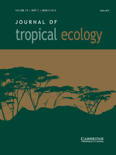
JOURNAL OF TROPICAL ECOLOGY
Connecting Researchers to the Heart of Tropical BiodiversityThe JOURNAL OF TROPICAL ECOLOGY, published by Cambridge University Press, serves as a pivotal platform for advancing knowledge in the field of ecology, particularly within tropical environments. With an ISSN of 0266-4674 and an E-ISSN of 1469-7831, this esteemed journal has been a key resource since its inception in 1985, maintaining a focus on empirical research that addresses the complexities of tropical ecosystems. It holds a respectable Q3 ranking in the Ecology, Evolution, Behavior and Systematics category as of 2023, indicating its significant contribution to the field, although it remains within the competitive mid-range. The journal publishes original research, reviews, and methodological articles that illuminate the rich biodiversity and unique ecological processes of tropical regions, fostering a deeper understanding of conservation challenges. Accessible from the United Kingdom, this publication appeals to a diverse audience of researchers, professionals, and students keen on exploring ecological dynamics in tropical settings, and plays a crucial role in promoting scientific discourse and collaborative efforts aimed at preserving our planet's vital ecosystems.
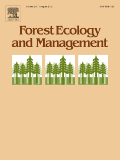
FOREST ECOLOGY AND MANAGEMENT
Fostering Sustainable Solutions for Global ForestsFOREST ECOLOGY AND MANAGEMENT is a premier peer-reviewed journal dedicated to the integral study of forest ecosystems and their management, published by Elsevier in the Netherlands. With an impactful presence in the field, this journal boasts a prestigious Q1 ranking in multiple categories, including Forestry, Management, Monitoring, Policy and Law, and Nature and Landscape Conservation as of 2023. It addresses key issues relevant to sustainable forest practices, conservation strategies, and environmental monitoring, making it a vital resource for researchers, practitioners, and policymakers alike. The journal is indexed with an impressive Scopus rank, placing it among the top tier of titles in Agricultural and Biological Sciences and Environmental Science. While it does not offer Open Access options, its rigorous review process and high visibility make it essential for those seeking to stay abreast of the latest findings and trends in forest ecology and management. Published continuously since 1976, FOREST ECOLOGY AND MANAGEMENT aims to foster interdisciplinary collaboration and advance knowledge critical to the stewardship of forest resources in an ever-changing global landscape.
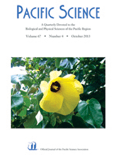
PACIFIC SCIENCE
Cultivating Knowledge Across the Pacific LandscapePACIFIC SCIENCE is a prestigious multidisciplinary journal published by University of Hawaii Press, dedicated to advancing knowledge across diverse fields of study related to the Pacific region. With a robust ISSN of 0030-8870 and an E-ISSN of 1534-6188, this journal serves as a vital platform for researchers, professionals, and students to disseminate and access influential research findings that contribute to the understanding of ecological, cultural, and social dynamics in the Pacific. The journal has steadily maintained its relevance since its inception in 1947 and features a commendable Scopus Rank of #74 out of 171 in the multidisciplinarity category, placing it in the 57th percentile of its field, and is recognized as having a Q2 quartile ranking in 2023. Although lacking open access options, PACIFIC SCIENCE offers in-depth analysis and scholarly discourse, effectively bridging various disciplines to foster collaboration and innovation. With its commitment to high-quality research and its significant impact on Pacific studies, the journal continues to play an important role in informing policy, conservation efforts, and community engagement within this vital region.

Ecosistemas
Empowering ecological research for a thriving planet.Ecosistemas is a prominent Open Access journal published by the ASOCIACION ESPANOLA ECOLOGIA TERRESTRE, specializing in the field of ecology. Since its inception in 2001, it has dedicated itself to advancing ecological knowledge and research, fostering an inclusive platform for the dissemination of cutting-edge studies that span ecological interactions, sustainability, and biodiversity. The journal, based in Spain, has established its reputation with notable rankings such as Q3 in the field of Ecology and Q4 in Ecology, Evolution, Behavior, and Systematics, reflecting its commitment to quality research. With a Scopus Ranks position placing it in the 40th and 37th percentiles for its categories, Ecosistemas is integral to the academic community, serving researchers, professionals, and students alike. It provides a vital resource for those seeking to understand ecological dynamics and environmental challenges, facilitating open access to important findings and discussions that shape the future of our ecosystems.
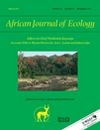
AFRICAN JOURNAL OF ECOLOGY
Fostering Insights into Biodiversity and BehaviorThe African Journal of Ecology, published by Wiley, is a leading academic journal in the field of Ecology, Evolution, Behavior, and Systematics. Established in 1963 and continuing its vital contributions to the field until 2024, this journal serves as a premier platform for researchers and scholars to share groundbreaking studies that explore the intricate relationships within ecosystems, particularly in the African context. With an impressive Scopus Rank of #423 out of 721 and a Q3 Quartile ranking, it stands as a credible source of scholarly information, gaining recognition among peers for its rigorous peer-review process and impactful publications. While the journal is not open access, it remains influential in driving advancements in ecological research and providing insights vital for conservation efforts and biodiversity studies. Authors and readers alike will find that the African Journal of Ecology not only promotes scientific inquiry but also fosters a deeper understanding of ecological dynamics that affect our world.
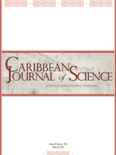
CARIBBEAN JOURNAL OF SCIENCE
Catalyzing scientific discovery in the Caribbean community.Caribbean Journal of Science, published by the University of Puerto Rico, serves as a crucial platform for disseminating innovative research in the field of science across the Caribbean region. With an ISSN of 0008-6452, this journal captures the essence of multidisciplinary studies, ranking 47 out of 111 in its category, showcasing a 58th percentile within Scopus. Although it doesn't currently offer Open Access, it has extended its academic reach since its inception in 1980, fostering collaboration and knowledge growth among researchers, professionals, and students alike. The journal covers an expansive range of scientific disciplines and continues to be a vital resource for those seeking to engage with and contribute to the scientific landscape of the Caribbean. For anyone dedicated to advancing scientific inquiry and practice in this vibrant region, the Caribbean Journal of Science represents an invaluable asset.
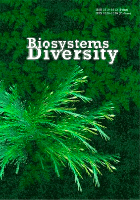
Biosystems Diversity
Advancing Knowledge in Biodiversity and BeyondBiosystems Diversity is an esteemed open access journal published by the Oles Honchar Dnipro National University since 2009, based in Ukraine. Focusing on a wide array of topics within the fields of Ecology, Evolution, Behavior, and Systematics, the journal aims to foster the dissemination of cutting-edge research and innovative methodologies in understanding biodiversity and ecological interactions. With its ISSN 2519-8513 and E-ISSN 2520-2529, Biosystems Diversity has seen a consistent growth trajectory, earning a Q3 category for Ecology and a Q4 classification for Ecology, Evolution, Behavior and Systematics as of 2023, reflecting its dedication to high standards of scholarly excellence. The journal's rankings in Scopus solidify its relevance in the academic community, providing researchers and practitioners with vital insights into contemporary environmental challenges. As it converges towards its 2024 target, Biosystems Diversity continues to empower scientists, students, and professionals alike to explore new dimensions in the study of biological systems, offering crucial open access options for broader reach and engagement.

NOTORNIS
Championing the study of birds for biodiversity.NOTORNIS is a prestigious academic journal published by the Ornithological Society of New Zealand, dedicated to advancing the field of ornithology and contributing meaningful research related to avian species. With ISSN 0029-4470 and E-ISSN 1177-7680, this journal has been a vital resource for scholars since its inception in 1982, continuously fostering discourse within the scientific community, particularly in the realms of animal science and zoology. Though it currently holds a quartile ranking of Q4, with a Scopus rank of #250 out of 490 in its category, NOTORNIS occupies a unique niche in ornithological research, promoting studies that highlight the ecological and biological intricacies of birds. This journal is critical not only to researchers and professionals in zoology but also to students and educators aiming to engage with contemporary avian research. As New Zealand's leading ornithological publication, NOTORNIS underscores the importance of avifaunal studies in conserving biodiversity and understanding ecological dynamics.
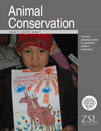
ANIMAL CONSERVATION
Uniting Voices for Global Conservation Efforts.Animal Conservation is a prestigious journal that serves as a vital platform for the dissemination of research dedicated to the preservation of wildlife and habitats. Published by Wiley, this journal has established a significant presence in the fields of Ecology and Nature and Landscape Conservation, holding a distinguished Q1 category ranking for both in 2023. With an impressive Scopus rank of #25 in the realm of environmental science, it caters to a global audience keen on understanding and addressing pressing conservation issues. The journal provides researchers, professionals, and students with high-quality, peer-reviewed articles that explore innovative methods and strategies in animal conservation. With its continuous publication since 1998, encompassing a comprehensive range of topics, Animal Conservation is indispensable for anyone aiming to make impactful contributions to the field of ecology and conservation biology.

Alpine Entomology
Connecting Researchers in the Heart of Alpine EcosystemsAlpine Entomology is a pioneering open-access journal published by Pensoft Publishers, dedicated to advancing the study of insect science and ecology, with a particular focus on mountainous environments. Launched in 2017 and accessible online, this journal provides a vital platform for researchers, professionals, and students to share their findings and insights in a rapidly evolving field. With its ISSN N/A and E-ISSN 2535-0889, Alpine Entomology has been recognized for its contributions, achieving Q3 category rankings in 2023 across several disciplines, including Animal Science and Zoology, as well as Ecology and Insect Science. Set in Sofia, Bulgaria, the journal exemplifies a commitment to promoting high-quality research and enhancing collaboration among scientists globally. Through its open-access model, it ensures that groundbreaking research is widely disseminated, helping to bridge gaps in knowledge and fostering a deeper understanding of alpine ecosystems and their intricate insect communities.